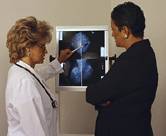DDT Compound Speeds Breast Cancer Growth
Insecticide metabolite disrupts hormone-sensitive cells, study finds.
|
E-mail this article
Subscribe to news
Printer friendly version
|

(SOURCE: BioMed Central, news release, Feb. 13, 2008)
THURSDAY, Feb. 14 (HealthDay News) -- A new Canadian study may finally explain how a key compound found in the U.S.-banned insecticide DDT accelerates the growth of breast cancer tumors.
The new report, published in the open access journal Breast Cancer Research, suggests that DDT's main metabolite blocks a pathway of a hormone that would otherwise help inhibit growth in normally responsive breast cancer cells.
In their study, researchers from Universite Laval and Institut national de santé publique in Quebec found that the metabolite blocked the androgen receptors (AR) found on certain human breast cancer cells.
When added to cancer cells having AR, potent androgen compounds slow the tumor's growth. But the researchers found that when increasing concentrations of the metabolite were added, the androgen-mediated effects were blocked. The growth of breast cancer cells known as CAMA-1 actually accelerated, even when androgen was present to try to mitigate the presence of the hormone estrogen, which normally signals the cancer cells to grow.
"Our results suggest that in addition to estrogenic compounds, which have been the main focus of researchers over the past decades, chemicals that block the AR could favor breast cancer progression," lead researcher Pierre Ayotte said in a prepared statement.
DDT, a widely used insecticide in the United States from World War II through the 1970s, has been linked to breast cancer in previous studies. It was banned stateside following concerns about its affects on wildlife, the environment and human health, but it is still used in some other countries.
More information
Learn more about the role of hormones and breast cancer through the nonprofit organization breastcancer.org. 
Copyright © 2008 ScoutNews, LLC. All rights reserved. 
HealthDayNews articles are derived from various sources and do not reflect federal policy. healthfinder.gov does not endorse opinions, products, or services that may appear in news stories. For more information on health topics in the news, visit the healthfinder.gov health library.